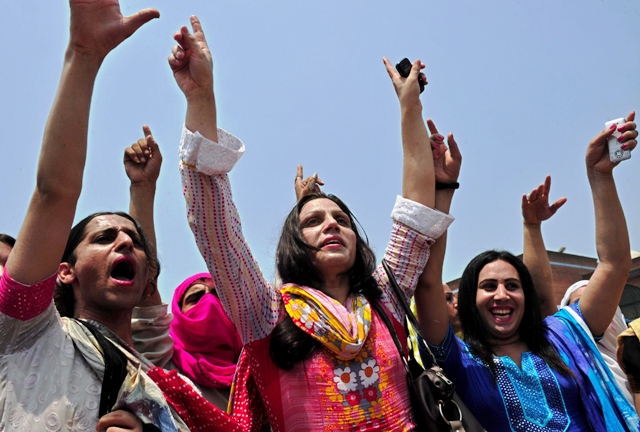
Payal had always been remarkably light on her feet— at least as light as one can be with a gangling frame. Although some may say her choreography lacked sophistication, those who paid to watch her caper and cavort, would say that she rode with the wind. Her jaunty strides became her inlet into Peshawar’s most vibrant parties. Birthdays, weddings, fairs, events— soon there was not a stage too big or small for the 23-year old’s feet.
For a transgender dancer, living in a city with a flailing tolerance for non-conformity, all of these were still sizeable opportunities. They afforded her a somewhat steady income, a roof above her head and the warmth of her community. After what seemed like a lifetime, Payal was finally happy with where she was.
At the time, however, the performer had not the slightest inkling about the changes taking place in her body, which would soon manifest as a dire affliction. One likely to change the course of her life for years to come.
“I had sustained some injuries which resulted in excessive bleeding, some three years ago. I was taken to Peshawar’s Lady Reading Hospital, where the doctor advised me to get a blood test. I had no idea of a deeper issue, but as the doctor read my report to me, it was as if my blood froze and I saw my entire life flash by me,” the nimble-footed dancer recalled.
According to the prognosis and the blood report, Payal had been diagnosed with HIV infection, a sexually transmitted disease which has long plagued the local transgender community. Although Payal’s contraction of the disease was traced back to her frequent use of unsterilised needles. Something she had never imagined would one day land her in the perils of a life-threatening disease.
In the last 15 years, there have been over 32 reported cases of HIV/AIDs within Peshawar’s transgender community, out of which at least three have lost their lives. Seven, including Payal are currently under treatment at the Family Care Centre of the Hayatabad Medical Complex.
“There are few people as lucky as I am to have the opportunity to seek treatment before it’s too late. I visit the centre regularly for follow-ups, and for treatment every two months. As with my case, early diagnosis can really increase the chances of survival and a healthy life, which I am holding onto hope for,” expressed Payal.
Read More: Ayan wins big in 2nd K-P transgender sport festival
However, one the biggest hurdles obstructing transgender access to timely diagnosis and treatment in Khyber Pakhtunkhwa is the severe stigma associated with contraction of sexually transmitted diseases. Which often discourages community members from seeking immediate help, as recommended.
“I was quick to act, but not many are. There is always this fear of possible ostracization from the community and the society. Many times when transgender people here do decide to visit the hospital, they have to wear a disguise and do it hush-hush. Even then, there’s a whole list of social, financial, mental and physical challenges one has to face in their journey towards recovery. It can all be very discouraging,” said Payal.
According to local psychologist Dr Khalid Mufti, such fears and anxieties can cause a severe mental strain on people diagnosed with the disease.
“Therefore counselling is an essential part of HIV recovery. Sadly, however, not many people have access to it. It’s only the wealthy who can afford counselling on top of more dire expenses like food, housing, separate washrooms etc. In such circumstances, a change of societal attitude towards the infected can be prove to be life-saving. The government should work on that too,” the doctor advised.
Published in The Express Tribune, January 26th, 2021.





1731916090-0/sabrina-(3)1731916090-0-165x106.webp)












COMMENTS
Comments are moderated and generally will be posted if they are on-topic and not abusive.
For more information, please see our Comments FAQ